Тема: Who is a Hero?
Цель: совершенствование речевых навыков по теме «Кто такой герой?»
Задачи: 1) совершенствовать коммуникативно-речевые навыки уч-ся;
2) развивать навыки аудирования и чтения с общим охватом содержания;
3) формировать грамматические навыки употребления придаточных определительных предложений с союзом who;
4) развивать способности осуществлять репродуктивные и продуктивные речевые действия;
5) формировать представления о том, кто может быть назван настоящим героем;
6) развивать культуру общения на английском языке.
Наглядный материал: презентация
Раздаточный материал: карточки с заданиями.
Ход урока.
I. Warm-up.
Good morning. Nice to meet you. How are you today? I’m glad you are OK. I hope today you will be attentive, active and don’t be afraid to speak English.-What date is it today? -What day of the week is it today? – What’s the weather like?
-We are going to find out who you can call a hero, qualities a real hero has. Our main point is speaking about real heroes. Also we will develop listening comprehension and reading for the main idea skills. (Слайд 1)
II. Revision.
- I want you to review a vocabulary of your previous lesson.
- Give synonyms for the word famous. (2 pupils at the board)
( well-known, great, outstanding, world-famous, best-known, respectful, legendary, VIP, a celebrity, a hero, celebrated, noted, renowned [ri’naund], illustrious [I ‘lΛstri?s])
- You have got cards. Ask each other. Ex.2a p.58 will help you. Open your books.
Cards:
1. What’s the English for «поставить цель»? (set the goal)
2. What’s the English for «показать пример»? (set an example)
3. What’s the English for «поступок»? (deed).
4. Think of the English equivalent for the word «необычный». (extraordinary)
5. Find the sentence «Мой друг очень отважный и смелый мальчик. Он всегда постоит за правду и никогда не сдаётся в трудных ситуациях». (My friend is a very courageous and honest boy. He will always stand up for what is right and never gives up in difficult situation.)
6. Find the sentence «Он не боится преодолевать трудности. Поэтому я его уважаю». (He is not afraid to overcome hardships on his way. That’s why I respect him so much.)
- Read to explanations of the words and find the definitions. (Слайд 2)
-Can be said of someone who is not afraid of taking risks, and seems to like doing new, dangerous, unusual or shocking things. (brave)
- Can be said someone who doesn’t show that he/she is afraid of frightening situation or when he/she has to do something dangerous, painful or unpleasant. (courageous)
- Let’s read the words. (Слайд 3)
- Check your classmates.
- Say who these famous people are and who you admire using the words you have revised. (Слайд 4)
III. Homework.
- Zakhar will tell us about Gagarin. Your Presentation.
- Express your opinions if we can call him a hero?
IV. Vocabulary.
- What words can we form from the word a hero. (Слайд 5)
- What is the difference between a hero, heroism [‘her?uiz?m] and heroic [hi’r?uik]
- What suffixes help us to form these words?
a hero – a noun meaning a person
heroism – a noun meaning a quality
heroic – an adjective meaning a quality
-Ex.2b p.58 Group the words in the box
- Sum up about the meaning of the suffixes.
V. Listening for the main ideas. (Слайд 6)
- Listen to the interviews and do the tasks in groups.
Yellow group: tick who mentions what. Ex.3a, p.58
Orange group: complete the sentences. Ex.3b, p.59
to be on one’s own
generous
rude
define
a philosophy graduate
- Who’s Masha’s (Max’s, Stepan’s ) hero?
- Check.
I think your eyes are tired let’s have a rest now:
Look left, right
Look up, look down
Look around.
Look at your nose
Look at that rose
Close your eyes
Open, wink and smile.
Your eyes are happy again.
VI.Speaking ( in pairs). (Слайд 7)
- Read the phrases and share your opinions with the partner which of them describe a real hero.
1) a woman who stops working to care for her mother who is seriously ill
2) a rich businessman who gives a very large sum of money to build a school for children who have no parents.
3) a nine-year-old girl who saves her drowned friend
VII.Reading.
-Does age matter?
-Read the text and answer the questions in a chain: (Слайд 8)
- What’s the girl’s name?
- How old was she?
- What happened on the pond?
- Was she afraid?
- What award did she get?
- What kind of person is she?
- Do you find this story impressive? Why?
- In spite of her age she is a hero, because she overcame her fears and saved her friend’s life.
Text:
The CHILD HERO AWARDS ceremony has been going for 4 years. It’s for children who have done something very special, something extraordinary. There was a little girl called Kira on the ceremony; she is 10 now. Her story really impressed me because she is so brave.
Kira’s friend fell into a hole in the ice when they were ice-skating on the pond. Immediately Kira ran up to her friend and started pulling her out even though there was a danger that she could fall in too. After a really hard struggle Kira pulled her friend out and saved her life. Kira was 8 at that time and the little girl was 4. Without Kira’s quick thinking the child could have drowned.
VIII.Speaking (group work).
- To answer the main questions of our lesson you should choose 5-6 qualities of a hero and express the opinions about your partner’s statements (agree or disagree) Ex.4 p.59
- Revise relative clauses with who that comes after relative pronouns. (Слайд 9)
- Draw your attention to the language support. (Слайд 10)
- And you? Can you be heroes? It depends on you. Ordinary people can be heroes. They must give a lot to other people. They do good deeds every day. It doesn’t depends on money, popularity.
- You should try to overcome hardships on your way. This song is called “We shall overcome” by L.Armstrong.
IX. Conclusion.
- It’s time to come up to the conclusion. (Summing up) (Слайд 11)
- Did you like the lesson?
- What did you like doing at the lesson most of all?
- I want to finish our lesson with the words: (Слайд 12)
A man of words and not of deeds,
Is like a garden full of weeds. (Nursery rhyme)
- I'd like to thank you for good work at the lesson. I give excellent marks to..., good- to :, etc.
- I wish you good luck.
- Write down your homework. (Слайд 13)
- The lesson is over. See you later. Good-bye! (Слайд 14)
Просмотр содержимого документа
«Who is a hero»
| МБОу лицей №1 |
| Who is a hero? |
| New Millennium English - 8 |
|
|
| Леонтьева Елена Валерьевна |
| ![]()
|
План-конспект урока английского языка в 8 классе УМК О.Б.Дворецкая, Unit 4, Lesson 3
Тема: Who is a Hero?
Цель: совершенствование речевых навыков по теме «Кто такой герой».
Задачи: 1) совершенствовать коммуникативно-речевые навыки уч-ся;
2) развивать навыки аудирования и чтения с общим охватом содержания;
3) формировать грамматические навыки употребления придаточных определительных предложений с союзом who;
4) развивать способности осуществлять репродуктивные и продуктивные речевые действия;
6) формировать представления о том, кто может быть назван настоящим героем;
5) развивать культуру общения на английском языке.
Наглядный материал: презентация
Раздаточный материал: карточки с заданиями.
Ход урока.
I. Warm-up.
Good morning. Nice to meet you. How are you today? I’m glad you are OK. I hope today you will be attentive, active and don’t be afraid to speak English.
-What date is it today? -What day of the week is it today? – What’s the weather like?
-We are going to find out who you can call a hero, qualities a real hero has. Our main point is speaking about real heroes. Also we will develop listening comprehension and reading for the main idea skills. (Слайд 1)
II. Revision.
- I want you to review a vocabulary of your previous lesson.
-Give synonyms for the word famous. (2 pupils at the board)
( well-known, great, outstanding, world-famous, best-known, respectful, legendary, VIP, a celebrity, a hero, celebrated, noted, renowned [ri’naund], illustrious [I ‘lΛstriəs])
- You have got cards. Ask each other. Ex.2a p.58 will help you. Open your books.
Cards:
1. What’s the English for «поставить цель»? (set the goal)
2. What’s the English for «показать пример»? (set an example)
3. What’s the English for «поступок»? (deed)
4. Think of the English equivalent for the word «необычный». (extraordinary)
5. Find the sentence «Мой друг очень отважный и смелый мальчик. Он всегда постоит за правду и никогда не сдаётся в трудных ситуациях». (My friend is a very courageous and honest boy. He will always stand up for what is right and never gives up in difficult situation.)
6. Find the sentence «Он не боится преодолевать трудности. Поэтому я его уважаю». (He is not afraid to overcome hardships on his way. That’s why I respect him so much.)
-Read to explanations of the words and find the definitions. (Слайд 2)
-Can be said of someone who is not afraid of taking risks, and seems to like doing new, dangerous, unusual or shocking things. (brave)
- Can be said someone who doesn’t show that he/she is afraid of frightening situation or when he/she has to do something dangerous, painful or unpleasant. (courageous)
- Let’s read the words. (Слайд 3)
- Check your classmates.
- Say who these famous people are and who you admire using the words you have revised. (Слайд 4)
III. Homework.
- Zakhar will tell us about Gagarin. Your Presentation.
- Express your opinions if we can call him a hero?
IV. Vocabulary.
- What words can we form from the word a hero. (Слайд 5)
- What is the difference between a hero, heroism [‘herəuizəm] and heroic [hi’rəuik]
- What suffixes help us to form these words?
a hero – a noun meaning a person
heroism – a noun meaning a quality
heroic – an adjective meaning a quality
-Ex.2b p.58 Group the words in the box
- Sum up about the meaning of the suffixes.
V. Listening for the main ideas. (Слайд 6)
- Listen to the interviews and do the tasks in groups.
Yellow group: tick who mentions what. Ex.3a, p.58
Orange group: complete the sentences. Ex.3b, p.59
to be on one’s own
generous
rude
define
a philosophy graduate
- Who’s Masha’s (Max’s, Stepan’s ) hero?
- Check.
I think your eyes are tired let’s have a rest now:
Look left, right
Look up, look down
Look around.
Look at your nose
Look at that rose
Close your eyes
Open, wink and smile.
Your eyes are happy again.
VI.Speaking ( in pairs). (Слайд 7)
- Read the phrases and share your opinions with the partner which of them describe a real hero.
1) a woman who stops working to care for her mother who is seriously ill
2) a rich businessman who gives a very large sum of money to build a school for children who have no parents.
3) a nine-year-old girl who saves her drowned friend
VII.Reading.
-Does age matter?
-Read the text and answer the questions in a chain: (Слайд 8)
- What’s the girl’s name?
- How old was she?
- What happened on the pond?
- Was she afraid?
- What award did she get?
- What kind of person is she?
- Do you find this story impressive? Why?
- In spite of her age she is a hero, because she overcame her fears and saved her friend’s life.
Text:
The CHILD HERO AWARDS ceremony has been going for 4 years. It’s for children who have done something very special, something extraordinary. There was a little girl called Kira on the ceremony; she is 10 now. Her story really impressed me because she is so brave.
Kira’s friend fell into a hole in the ice when they were ice-skating on the pond. Immediately Kira ran up to her friend and started pulling her out even though there was a danger that she could fall in too. After a really hard struggle Kira pulled her friend out and saved her life. Kira was 8 at that time and the little girl was 4. Without Kira’s quick thinking the child could have drowned.
VIII.Speaking (group work).
- To answer the main questions of our lesson you should choose 5-6 qualities of a hero and express the opinions about your partner’s statements (agree or disagree) Ex.4 p.59
- Revise relative clauses with who that comes after relative pronouns. (Слайд 9)
- Draw your attention to the language support. (Слайд 10)
- And you? Can you be heroes? It depends on you. Ordinary people can be heroes. They must give a lot to other people. They do good deeds every day. It doesn’t depends on money, popularity.
- You should try to overcome hardships on your way. This song is called “We shall overcome” by L.Armstrong.
IX. Conclusion.
- It’s time to come up to the conclusion. (Summing up) (Слайд 11)
- Did you like the lesson?
- What did you like doing at the lesson most of all?
- I want to finish our lesson with the words: (Слайд 12)
A man of words and not of deeds,
Is like a garden full of weeds. (Nursery rhyme)
- I'd like to thank you for good work at the lesson. I give excellent marks to..., good- to :, etc.
- I wish you good luck.
- Write down your homework. (Слайд 13)
- The lesson is over. See you later. Good-bye! (Слайд 14)
Просмотр содержимого презентации
«Who is a hero»
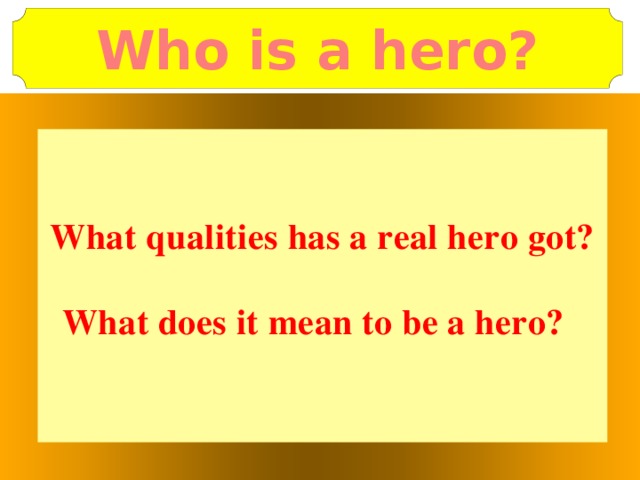
Who is a hero?
What qualities has a real hero got?
What does it mean to be a hero?
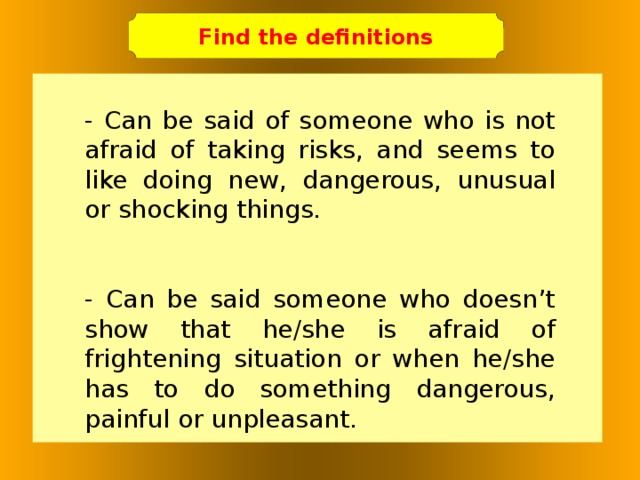
Find the definitions
- Can be said of someone who is not afraid of taking risks, and seems to like doing new, dangerous, unusual or shocking things.
- Can be said someone who doesn’t show that he/she is afraid of frightening situation or when he/she has to do something dangerous, painful or unpleasant.
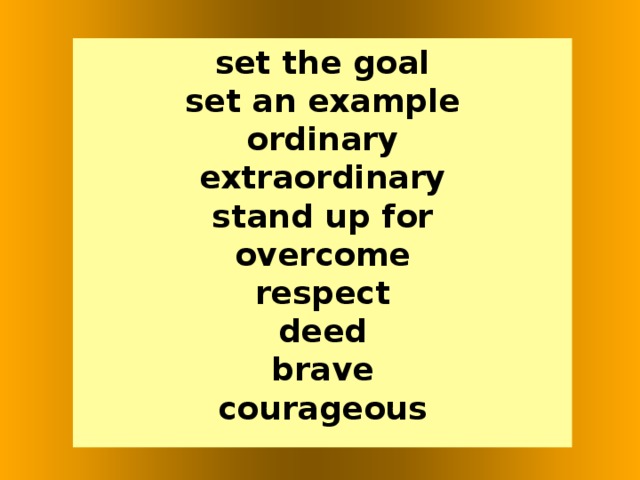
set the goal
set an example
ordinary
extraordinary
stand up for
overcome
respect
deed
brave
courageous
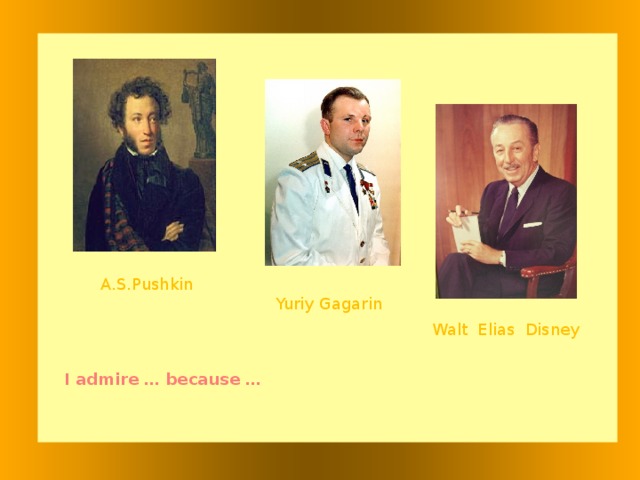
A.S.Pushkin
Yuriy Gagarin
Walt Elias Disney
I admire … because …
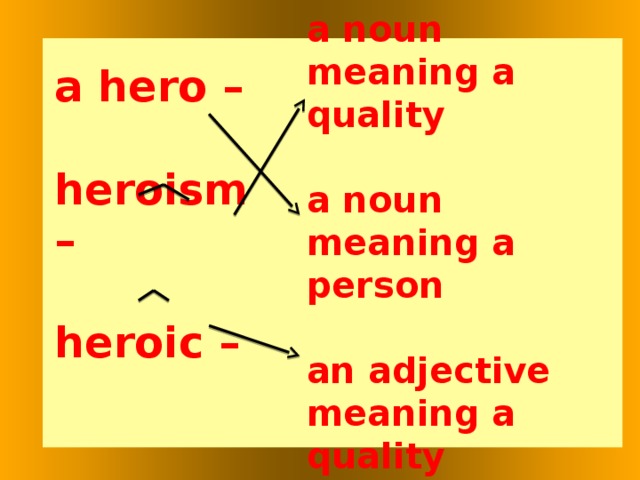
a noun meaning a quality
a noun meaning a person
an adjective meaning a quality
a hero –
heroism –
heroic –
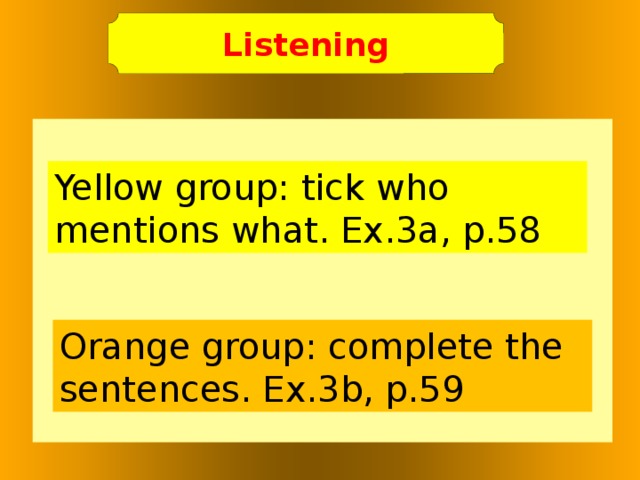
Listening
Yellow group: tick who mentions what. Ex.3a, p.58
Orange group: complete the sentences. Ex.3b, p.59
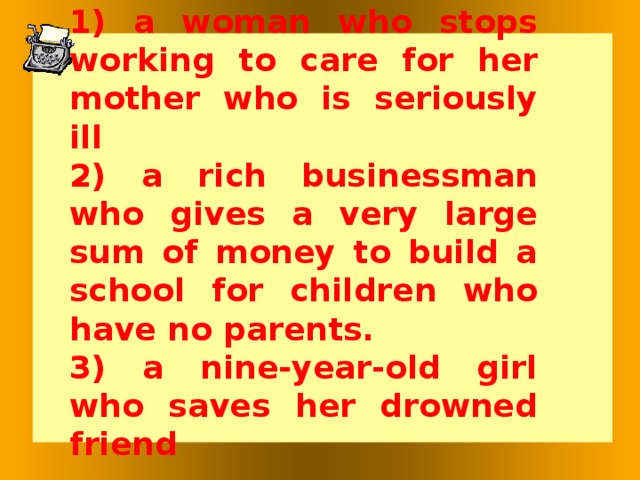
1) a woman who stops working to care for her mother who is seriously ill
2) a rich businessman who gives a very large sum of money to build a school for children who have no parents.
3) a nine-year-old girl who saves her drowned friend
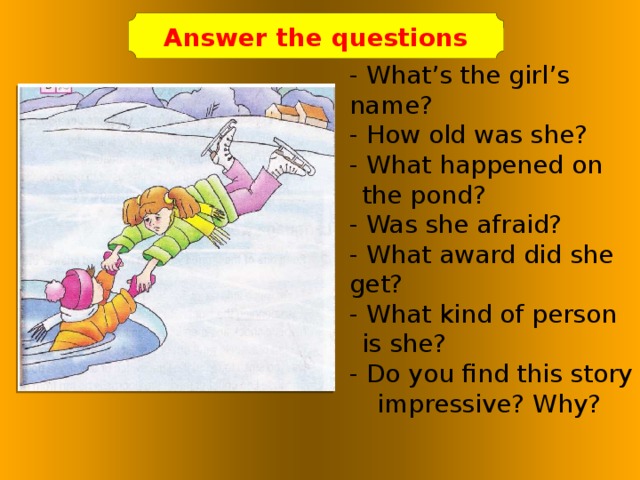
Answer the questions
- What’s the girl’s name?
- How old was she?
- What happened on the pond?
- Was she afraid?
- What award did she get?
- What kind of person is she?
- Do you find this story impressive? Why?
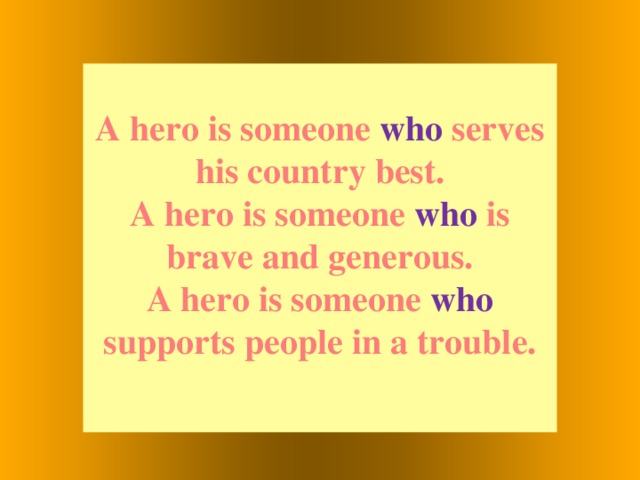
A hero is someone who serves his country best.
A hero is someone who is brave and generous.
A hero is someone who supports people in a trouble.
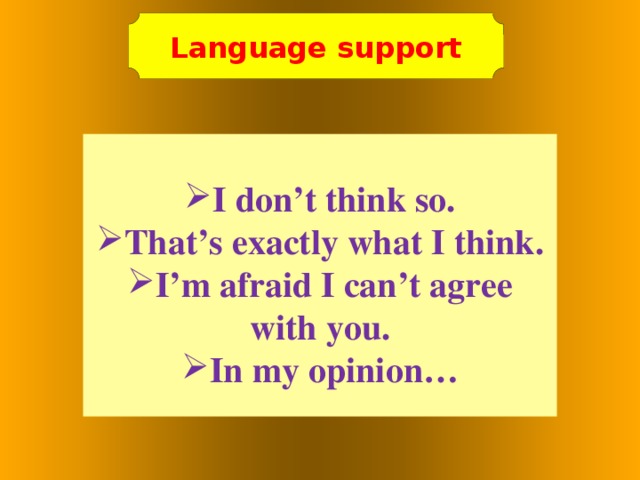
Language support
- I don’t think so.
- That’s exactly what I think.
- I’m afraid I can’t agree with you.
- In my opinion…
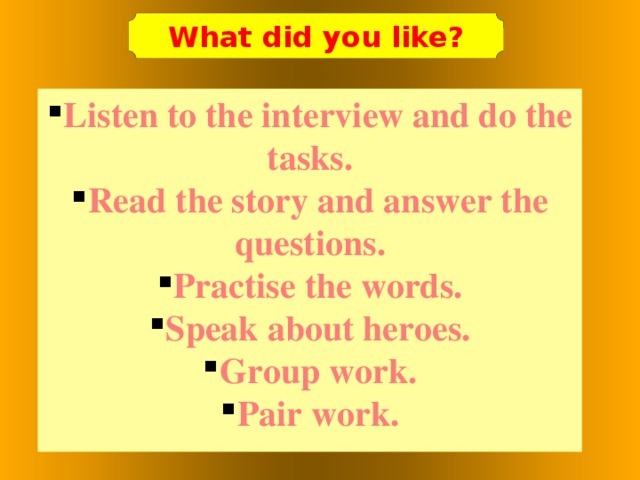
What did you like?
- Listen to the interview and do the tasks.
- Read the story and answer the questions.
- Practise the words.
- Speak about heroes.
- Group work.
- Pair work.
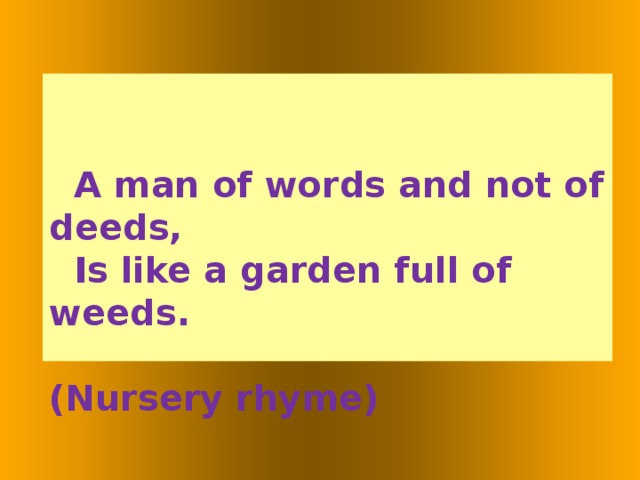
A man of words and not of deeds,
Is like a garden full of weeds.
(Nursery rhyme)
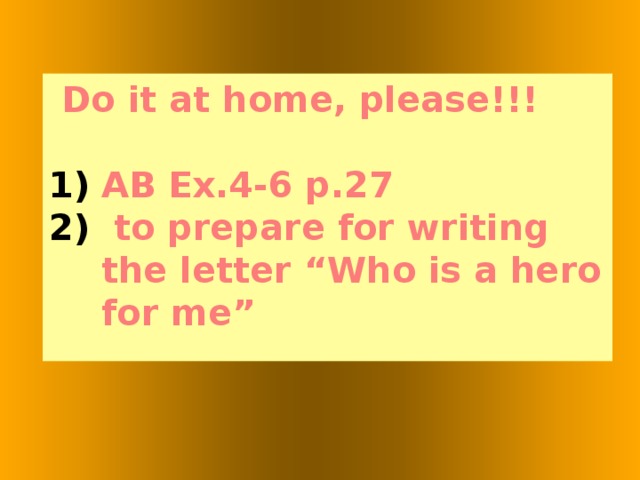
Do it at home, please!!!
- AB Ex.4-6 p.27
- to prepare for writing the letter “Who is a hero for me”

Thanks for your
good work!






























